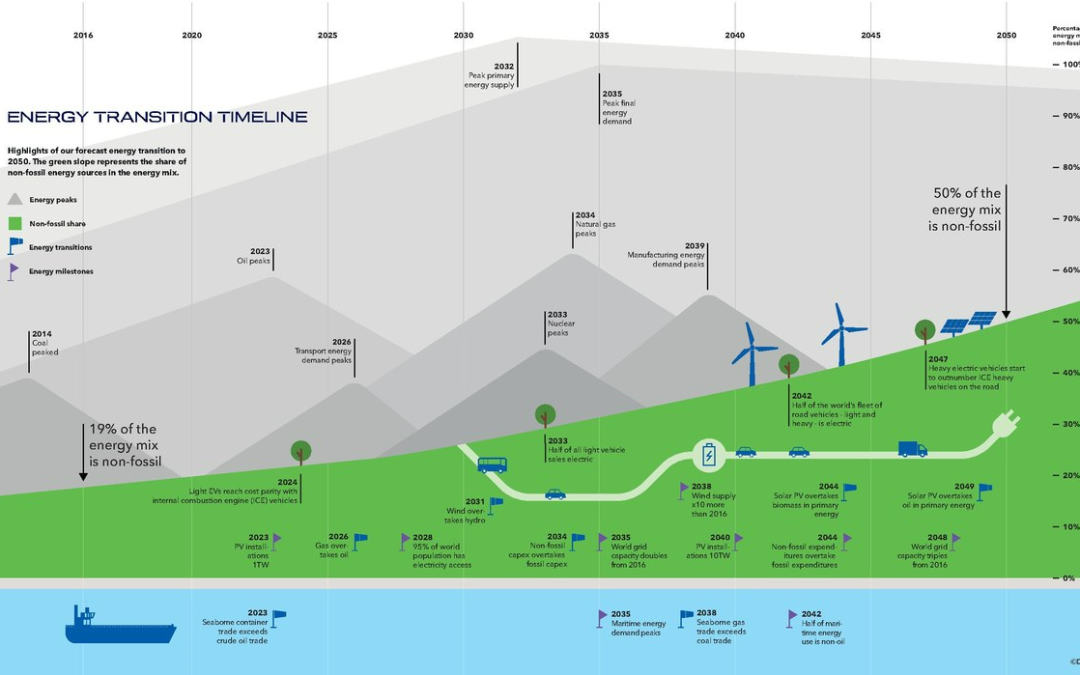About the Lighter Footprints Energy Transition Working Group
The Energy Transitions Group meets fortnightly with a focus on pulling together energy data, latest innovations and submissions to government and making climate solutions accessible to a variety of audiences. Find out more here.
You can subscribe to our quarterly Community Battery updates here, and check out our Solar page here.
Illustration: A graphic representation of the energy transition through to 2050, as forecast by risk management firm, DNV GL
List of most recent submissions
Oct 22 – Submission to the Federal Department of Climate Change, Energy, the Environment and Water on the proposed National Electric Vehicle Strategy
Key messages
Support strict, monitored and enforced fuel efficiency standards, see the need for coordination between state and federal governments.
Feb 23 – Submission on Safeguard mechanism
Key messages
Submission on the basis that, firstly our total opposition to new gas and coal be noted, secondly, that the Safeguard Mechanism (SM) legislation be written in such a way that new gas and coal cannot impact the existing non-gas, non-coal entities. And thirdly, that the gas and coal sector total emissions be progressively reduced (and not by the un-fettered use of offsets).
May 23 – Submission to the Essential Services Commission – Review of the Gas Distribution Code of Practice
Key messages
Reduce barriers to transitioning to electricity, require new customers to pay for their eventual disconnection, Review Unaccounted for Gas.
May 23 – Submission to the Federal Department of Infrastructure, transport and vehicle
Key messages
FES needs to be applied to all new vehicles, with light vehicles (GVM of 3.5t and lower – MA, NA, MC) ASAP and trucks, buses, and heavier vehicles to follow, FES should be the mechanism of the initial transition, ahead of bringing in a complete ban on new emitting vehicle sales (ICE) by 2035.
Jun 23 – Feedback on the AER’s issues paper on the gas distribution network reference tariff variation mechanism and declining block tariffs
Key messages
Governments must make clear decisions and stop prevaricating, must address issue of price shocks as customers leave (protecting low-income households and renters), support a revenue cap.
Sep 23 – Submission to the Victorian Government Department on Transport and planning on Zero Emission Bus Transition
Key messages
Strongly advocating battery electric buses
Sep 23 – Federal submission on Residential Electrification to the Senate Economics Reference Committee
Key messages
There is no time to waste. Don’t let perfection be the enemy of progress.
Residential electrification / efficiency can be accelerated by action at Federal, State, Local Governments and community groups.
Oct 23 – Submission to the ‘Community Engagement Review’ regarding renewable energy infrastructure and planning, developing and operating energy infrastructure to benefit communities, landowners and First Nations peoples
Key messages
De-carbonisation of the electricity grid can ill-afford delays.
Timing for new Transmission is currently not properly weighted in the AEMO Multi-criteria Assessments (MAC’s). Consider alternatives when contemplating transmission upgrades. First, Virtual Power Plants (VPP’s), and secondly, the increased penetration of normal rooftop solar (not aggregated under a VPP)..
Oct 23 – Feedback to Victoria’s Department of Energy, Environment and Climate Action on the role of renewable gas
Key messages
Produce a transition plan that will result in a speedy reduction in demand for fossil gas and communicate this plan widely.
Focus on residential and commercial customers giving time to deal with industry.
Develop a range of solutions for low-income households and renters.
Consider demand management options.Be aware of the developments in heat-pump technology and keep industry informed.
Provide assistance to industry on assessing their long-term fuel options.
Support industry to transition away from Fossil gas.
Nov 23 – Submission in response to the Future Gas Strategy consultation paper
Key messages
Our federal, state and territory work together and develop some policies that will lead to emissions reductions that will support the achievement of climate targets including a plan for Australia to transition off gas.
Australia stops approving any new coal or gas projects in line with the IPCC recommendation and looks for better alternatives.
Governments maintain a close watch on Carbon Capture and Storage (CCS) effectiveness as it is yet unproven.
Dec 23 – Response to the ESC’s draft Gas System Code of Practice
Key messages
Support for making new gas customers pay for the full cost of connection.
Provision of information and reporting requirements to better inform the transition.
Allowing customers to leave the network if they do not want hydrogen in their homes.
The ESC undertaking a review of the Gas Retail Code of practice.

